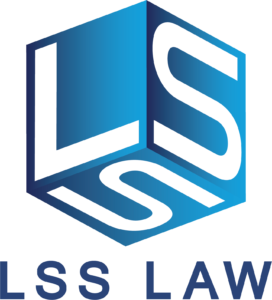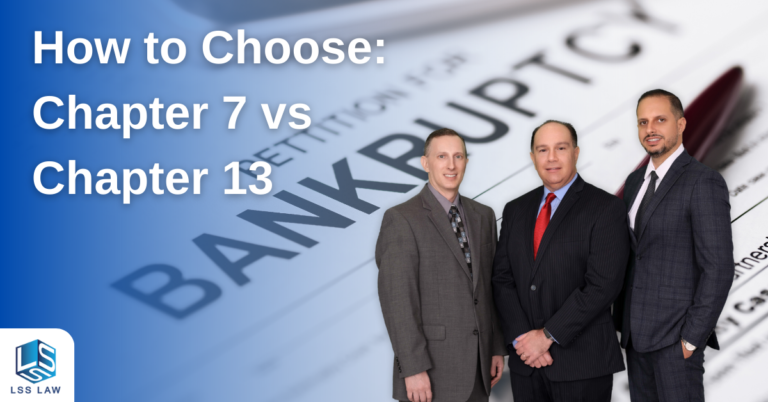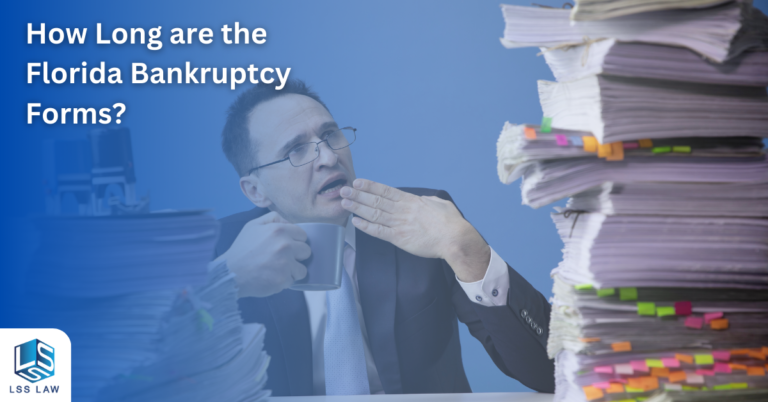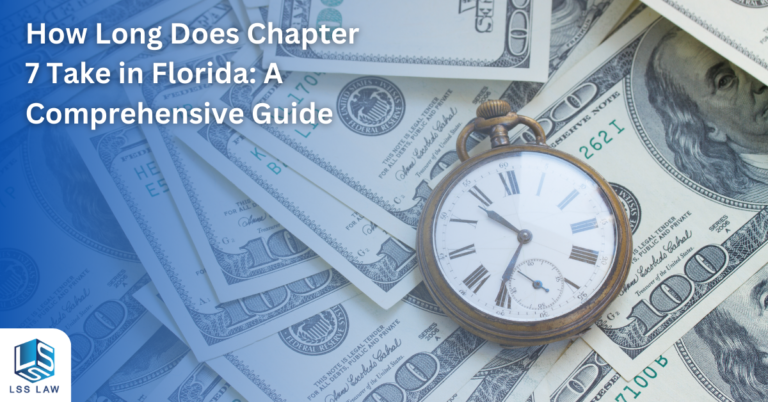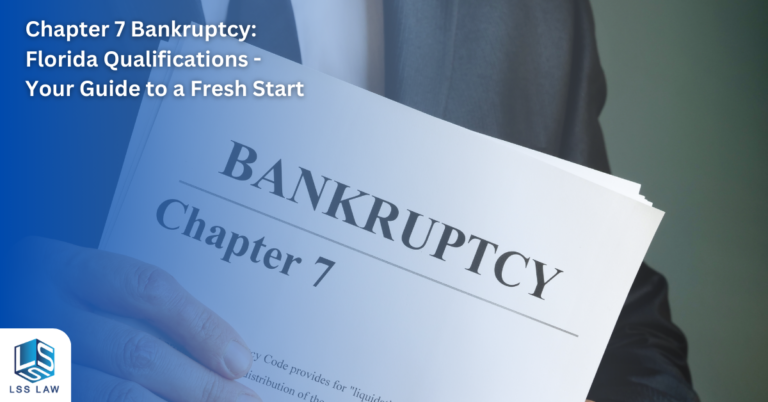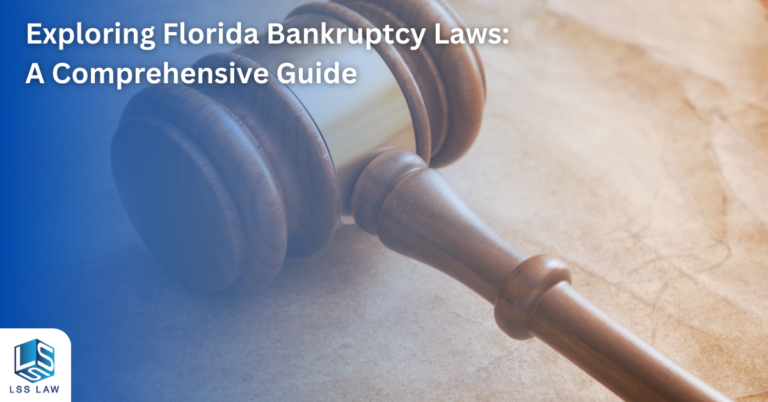Are you struggling with debt and considering bankruptcy as a way out? It can be a difficult and overwhelming decision to make, but it can also provide a fresh start and relief from financial stress. Understanding the different types of bankruptcy and which one is the best fit for your situation is crucial.
In this article, we will explore the differences between Chapter 7 bankruptcy and Chapter 13 bankruptcy, as well as the eligibility requirements and ideal candidates for each.
We will also discuss the benefits of working with experienced bankruptcy attorneys and introduce you to LSS Law, a South Florida law firm that can guide you through the bankruptcy process so you can finally get the financial relief that you need.
What Is Bankruptcy?
Bankruptcy is a legal process that allows individuals or businesses to have their debts forgiven or reorganized.
The purpose of bankruptcy is to provide a way for people who are unable to pay their debts to get a fresh start and become financially stable.
There are several types of bankruptcy, each of which has its own set of rules and procedures.
Different Types of Bankruptcy
There are several types of bankruptcy that individuals and businesses can file for, including:
- Chapter 7 bankruptcy: Also known as liquidation bankruptcy, Chapter 7 involves selling off non-exempt assets to pay off creditors. After the assets are sold, any remaining debts are forgiven.
- Chapter 11 bankruptcy: This type of bankruptcy is typically used by businesses, but it can also be used by individuals. It involves reorganizing debts and creating a repayment plan similar to Chapter 13 bankruptcy.
- Chapter 12 bankruptcy: This type of bankruptcy is similar to Chapter 13, but it is specifically for family farmers or fishermen. It allows them to reorganize their debts and create a repayment plan.
- Chapter 13 bankruptcy: Also known as reorganization bankruptcy, Chapter 13 involves creating a repayment plan to pay off debts over a period of three to five years. The debtor makes monthly payments to a bankruptcy trustee, who then distributes the funds to creditors.
Benefits of Filing for Bankruptcy
Filing for bankruptcy can provide several benefits, including:
- Stopping creditor harassment: Once you file your bankruptcy petition, an automatic stay goes into effect, which prohibits creditors from contacting you or taking any action to collect debts.
- Getting rid of certain debts: Depending on the type of bankruptcy you file for, you may be able to have certain debts forgiven. For example, in Chapter 7 bankruptcy, most unsecured debts (such as credit card debts and medical bills) are dischargeable debts. In Chapter 13 bankruptcy, you may be able to get certain debts modified or eliminated.
- Protecting assets: In Chapter 13 bankruptcy, you may be able to keep certain assets, such as your home or car, by creating a repayment plan. In Chapter 7 bankruptcy, you may be able to exempt certain assets, which means they cannot be sold to pay off creditors.
- Providing a fresh start: Bankruptcy can provide a fresh start by allowing you to get out of overwhelming debt and start rebuilding your credit.
Exploring Chapter 7 vs. Chapter 13 Bankruptcy
When considering bankruptcy, it’s important to understand the differences between Chapter 7 and Chapter 13 bankruptcy and which one is the best fit for your situation. Both types of bankruptcy can provide debt relief. Let’s take a closer look at each type of bankruptcy.
Chapter 7 and Chapter 13 Bankruptcy Differences
One of the main differences between Chapter 7 and Chapter 13 bankruptcy is the way debts are handled. In Chapter 7 bankruptcy, most unsecured debts (such as credit card debts and medical bills) are forgiven, and the debtor’s non-exempt assets are sold to pay off creditors.
In Chapter 13 bankruptcy, the debtor creates a repayment plan to pay off debts over a period of three to five years.
Another difference is the eligibility requirements for each type of bankruptcy. In order to file for Chapter 7 bankruptcy, the debtor must pass a means test, which determines if their household income is low enough to qualify for Chapter 7 bankruptcy.
In Chapter 13 bankruptcy, there are no income restrictions, but the debtor’s financial situation must include regular household income and their unsecured debts must be below a certain amount. This type of bankruptcy requires that the debtor repay debts in a more structured way.
Chapter 7 & Chapter 13 Eligibility Requirements
To be eligible for Chapter 7 bankruptcy, the debtor must pass a means test, which compares their income to the median income in their state. If the debtor’s income is below the median, they may be eligible for Chapter 7 bankruptcy.
If their income is above the median, they may still be able to file for Chapter 7 bankruptcy if their disposable income, after accounting for certain expenses, is low enough.
To be eligible for Chapter 13 bankruptcy, the debtor must have regular income and their unsecured debts (such as credit card debts and medical bills) must be below a certain amount.
There are no income restrictions for Chapter 13 bankruptcy, so even if the debtor’s income is above the median, they may still be eligible as long as they meet the other requirements.
The Ideal Candidate for Chapter 7 Bankruptcy
Chapter 7 bankruptcy is generally best suited for individuals who have low income and few assets that are not exempt from being sold to pay off creditors.
If you have a lot of unsecured debt and little disposable income, Chapter 7 bankruptcy may be a good option for you.
It is also a good option for those who do not have a lot of non-exempt assets, as these assets may be sold to pay off creditors in a Chapter 7 bankruptcy.
The Ideal Candidate for Chapter 13 Bankruptcy
Chapter 13 bankruptcy is generally best suited for individuals who have regular income and a significant amount of debt that they want to pay off over a period of time. If you have a lot of unsecured debt and a steady income, Chapter 13 bankruptcy may be a good option for you.
It is also a good option for those who want to keep certain assets, such as their home or car, as they can create a repayment plan to pay off their debts while still keeping these assets.
Chapter 7 & Chapter 13 Bankruptcy Code
The bankruptcy code is a federal law that outlines the rules and procedures for bankruptcy cases. Chapter 7 and Chapter 13 bankruptcy have different provisions in the bankruptcy code, which dictate how debts are handled and what is required of the debtor. In Chapter 7 bankruptcy, the debtor’s non-exempt assets are sold to pay off creditors, and any remaining debts are forgiven.
Chapter 13 bankruptcy allows someone to pay debts with monthly payments to the Chapter 13 bankruptcy trustee, who then distributes the funds to creditors. It is important to understand the provisions of the bankruptcy code and how they apply to your situation when considering bankruptcy. An experienced bankruptcy attorney can help you understand your options and determine the best course of action for your case. This includes understanding the differences between Chapter 7 and Chapter 13, and what types of debts are dischargeable during bankruptcy proceedings. Having a clear understanding of these will be beneficial in any bankruptcy filing, as they provide key information that will guide how your case plays out.
Secured Debt VS Unsecured Debt
When considering different forms of bankruptcy, it’s crucial to comprehend the distinction between secured and unsecured debt. Secured debt necessitates collateral, frequently used for things like real estate mortgages, car loans, and some personal loan types. If payments are missed, the creditor has the authority to reclaim the collateral used. On the other hand, unsecured debt does not have collateral and lenders solely depend on the borrower’s commitment to repay.
Examples of unsecured debt encompass the majority of credit card debt, student loan debt, medical bills, and non-dischargeable debts like child support and tax debts (which may be resolved during bankruptcy proceedings). Understanding these differences will assist you in managing your financial situation and determining the ideal type of bankruptcy for you.
In bankruptcy proceedings, dischargeable debts are those that can be forgiven or eliminated through the bankruptcy process. This means that, once the bankruptcy is finalized, the individual is no longer obligated to repay the discharged debts. However, it is important to note that not all debts are dischargeable, such as those related to criminal activities, debts incurred through fraud, and certain taxes. The specific debts that are dischargeable vary depending on the type of bankruptcy being filed and the jurisdiction in which the bankruptcy case is being handled. The bankruptcy court is responsible for overseeing the bankruptcy process, determining the dischargeability of debts, and ensuring that the process is carried out in accordance with the law.
Benefits of Working with an Experienced Bankruptcy Attorney
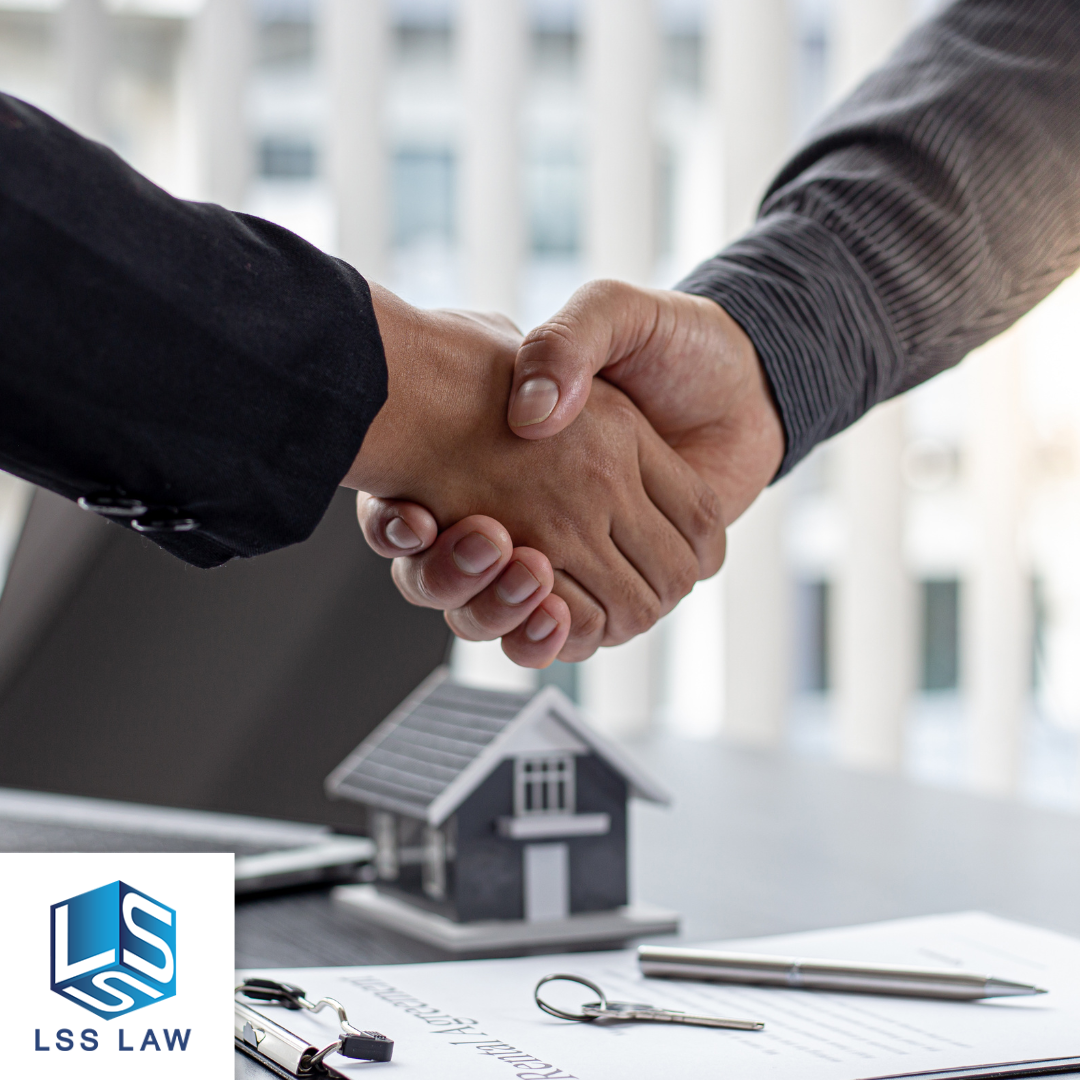
Filing for bankruptcy can be a complex and overwhelming process, so it is important to work with experienced bankruptcy attorneys who can guide you through the process and ensure that your rights are protected.
An experienced bankruptcy attorney can help you determine which type of bankruptcy is the best fit for your situation and assist you with the paperwork and other requirements. They can also help you understand the potential consequences of bankruptcy and advise you on how to move forward after your bankruptcy case is over.
Successful Bankruptcy Case Studies from Filing Bankruptcy
At LSS Law, we have helped many clients successfully navigate the bankruptcy process and get a fresh start. For example, we helped a client who was struggling with overwhelming medical bills and credit card debt file for Chapter 7 bankruptcy. After the successful bankruptcy filing, all of the client’s unsecured debts were forgiven and they were able to start rebuilding their credit.
LSS Law Also Helps Businesses
Another client we helped was a small business owner who was struggling to keep up with the demands of their business and their personal debts. We helped them file for Chapter 11 bankruptcy, which allowed them to reorganize their debts and create a repayment plan. The bankruptcy allowed the business to stay open and the owner was able to get back on track financially.
Contact Us For a No-Cost Bankruptcy Strategy Session

If you are considering bankruptcy and want to learn more about your options, we encourage you to schedule a no-cost Strategy Session with an experienced bankruptcy lawyer from LSS Law.
During the session, we will review your situation and discuss the best course of action. There is no obligation to move forward with our services, but we believe that you will find the session valuable and informative.
To schedule a no-cost Strategy Session and finally begin your journey towarddebt relief, please visit https://lss.law/contact or give us a call at 954-466-0541. We look forward to helping you get a fresh start and relief from financial stress.
Chapter 7 Bankruptcy vs Chapter 13 | Your Questions Answered
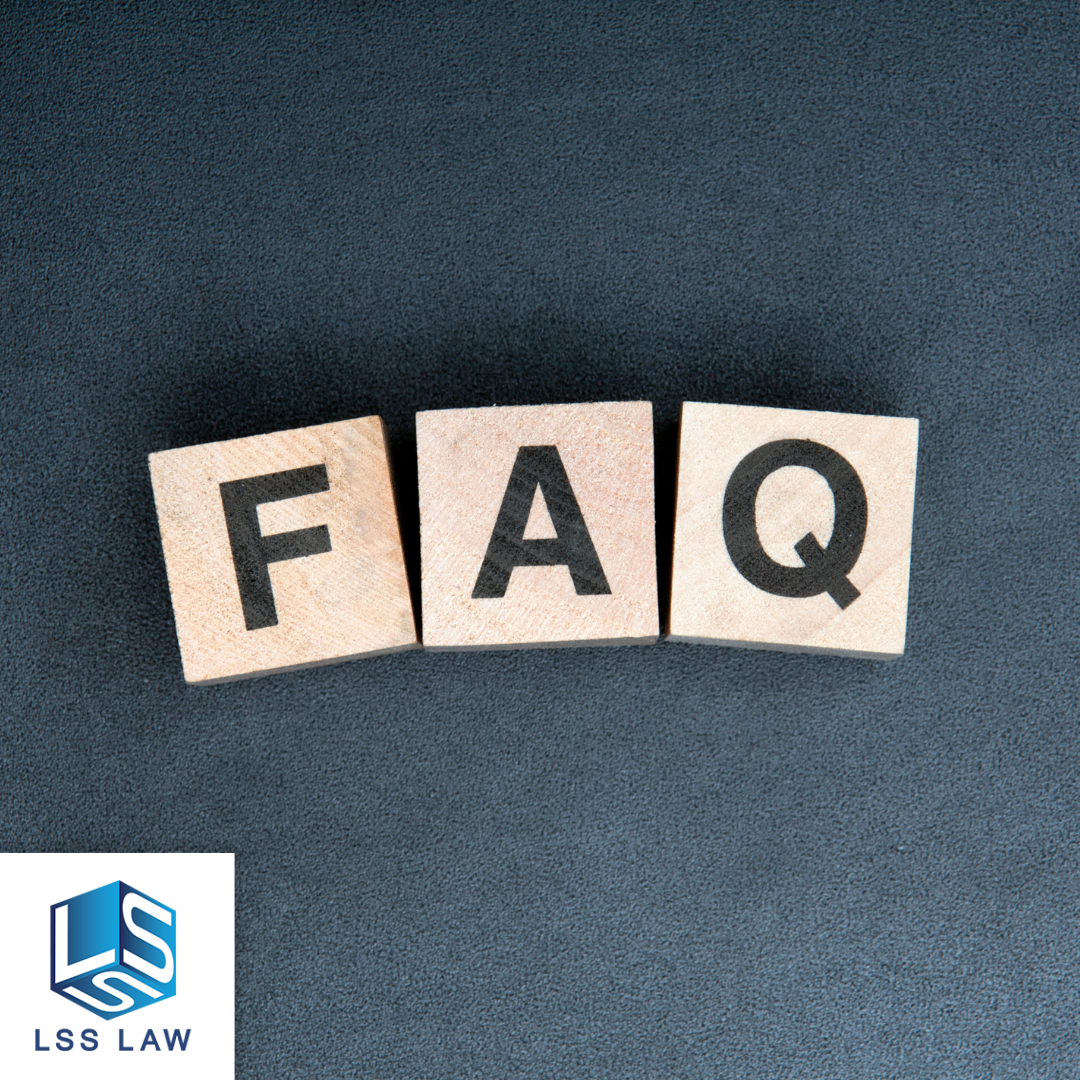
Here are some answers to commonly asked questions that can help you decide if you should declare bankruptcy:
What is the main difference between Chapter 13 Bankruptcy and Chapter 7 Bankruptcy?
The main difference between Chapter 13 and Chapter 7 bankruptcy is the way debts are handled. In Chapter 7 bankruptcy, most unsecured debts (such as credit card debts, personal loans, and medical bills) are forgiven.
Secured debts are debts that are tied to specific assets, such as a mortgage on a home or a car loan.
If the debtor wants to keep the asset, they must continue to make payments on the secured debt. The debtor’s non-exempt assets are sold to pay off creditors. In Chapter 13 bankruptcy, the debtor creates a repayment plan to pay off debts over a period of three to five years.
Which type of bankruptcy is best for me?
The best type of bankruptcy for you will depend on your individual circumstances. If you have low income and few assets that are not exempt from being sold to pay off creditors, Chapter 7 bankruptcy may be a good option.
If you have a regular income and a significant amount of debt that you want to pay off over a period of time, Chapter 13 bankruptcy may be a good option. An experienced bankruptcy attorney can help you determine which type of bankruptcy is the best fit for your situation.
How do I file for bankruptcy?
To file for bankruptcy, you will need to complete several steps, including:
- Determine which type of bankruptcy you are eligible for and which one is the best fit for your situation.
- Gather all of your financial documents, including income statements, bills, and tax returns.
- Meet with an experienced bankruptcy attorney to discuss your options and determine the best course of action.
- Complete the necessary paperwork and file it with the bankruptcy court.
- Attend a meeting with the bankruptcy trustee and your creditors.
- Complete any required credit counseling or financial management courses.
- Wait until the bankruptcy court approves your case.
It is important to work with an experienced bankruptcy attorney who can guide you through the process and ensure that your rights are protected.
